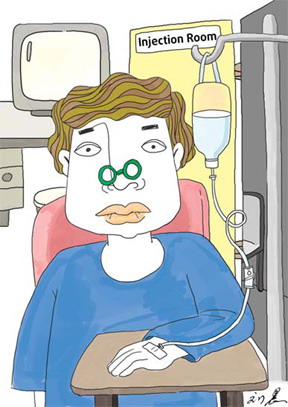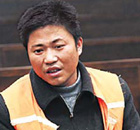Expats
View from inside the IV room
By Jon Van Housen (China Daily)
Updated: 2009-12-23 13:54
 |
Large Medium Small |
In my three years in Beijing, I had sometimes heard stories that China's doctors have a direct and ubiquitous answer for helping patients who have something more than the common cold - insert a needle somewhere and pump medicine directly into their system with an intravenous (IV) drip.

The approach always struck me as a bit ghoulish, an inelegant thing to do to already weakened people, further brutalizing them in their time of need. I just want to take a couple of pills a day if need be, preferably with vaguely French-sounding names.
But I was recently hit so hard by something I was willing to go to any length to find relief. To my dismay the prescribed treatment was daily visits to the China-Japan Friendship Hospital for an IV drip.
On the first day I squirmed in the chair as the kindly, but potentially sinister, nurses wheeled in a stand with several bags hanging from it, and worst of all, a long thin tube that ended in a needle. They matter-of-factly tapped the top of my hand - apparently that would be the appendage abused - and with no counseling to prepare me for the impending trauma, inserted it in me.
Well it didn't really hurt. I loosened my death grip on the chair, tried to get my heart rate down, and began to settle in for what promised to be several hours of anguish accompanied by Chinese TV that was on in the room.
As I shared the room with several other fellow sufferers, I was prepared to be as tolerant as possible, ready for their howls and wracking spasms of sickness. But one thing I found out that day is that sick people are, almost without exception, quiet.
| ||||
The second day I brought a book, made less of a drama as the nurses prepped my hand, and passed the time without incident.
And so the days went on. I soon adapted, sometimes as the proud possessor of the TV remote control which I would use to change to a channel showing sports. I got to know a few fellow returnees. Sometimes we would surreptitiously dial up the knob a bit so our drip would pick up the pace.
I even ran across a colleague who shared the room with me and we had time to talk more than we ever had before.
Other notable fellow inmates included a Singaporean who shared what his life in Beijing was like, a guy who looked Russian but spoke Chinese and a tiny little wide-eyed boy.
He is particularly memorable for his courage as they repeatedly attempted to find a vein in his foot with the needle as his mother watched in agony. Eventually they gave up, unsuccessful, and took him off for what I hoped was more humane treatment.
By the end, I was a hardened veteran. I barely noticed as the needle went in, though by that time both hands had served as pin cushions and the nurses were hard pressed to find new needle locales.
It worked and I survived to tell the tale.
So if you find yourself on the receiving end the dreaded IV program, I have a couple of comforting insights to pass along: The nurses are really, really good at getting those needles in - they do hundreds every month. And the direct frontal assault on your illness gives almost immediate results.











